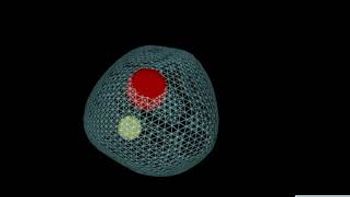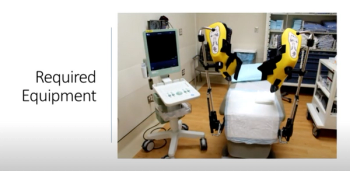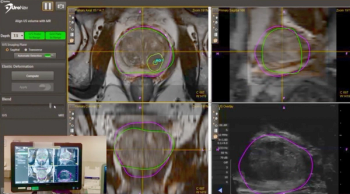
Germline and Somatic Testing in mCRPC
Episodes in this series

[Transcript]
Raoul Concepcion, MD, FACS: Circling back to the PROfound trial versus TOPARP. My recollection is TOPARP required metastases-directed biopsy, correct?
Jorge Garcia, MD: Correct.
Raoul Concepcion, MD, FACS: In PROfound, did they do both germline and somatic testing?
Jorge Garcia, MD: That’s a good question. PROfound used a specific assay that was part of the entry criteria. It was a foundation acid that is not actually part of-obviously, it’s not a standardized FDA approved test. Basically, that can include either liquid, cell-free DNA, an archived material, or a new biopsy. You know? But what I think is important-and we were talking earlier about the importance- is looking for that old material, archived material, because you still can capture some patients and find their DNA mutational changes in archive materials.
You may not need to be restricting your patients to cell-free DNA. Because as we know, some patients don’t have circulating tumor cells. You can rely also on archived material, which has its own complications and logistical challenges. But I think we want to capture the bulk of the patients, because if you look at germline, there’s only less than 10%. If you add on somatic changes, we may be able to actually capture around 15%, 20%, even up to 25% of patients who may be able to benefit from these agents.
Jahan Aghalar, MD: One very interesting point that came out of this trial is not only the results of the trial but the results of the screening that went on with this trial. Out of all the patients that were screened, believe it or not, 30% ended up having either a somatic or a germline mutation to indicate that they would benefit from these, from such an agent. In the clinic, when we’re facing a patient who’s progressing and they’re castration resistant, we should start having that in mind, in terms of somehow or another painting the archive tissue. Or perhaps even ideally getting a repeat biopsy. Or even if that’s not possible, there are liquid biopsies available that can screen these patients appropriately.
Jorge Garcia, MD: That’s for you guys, urologists, because the NCCN [National Comprehensive Cancer Center] Guidelines have changed and put that pressure on and you’ve seen that identifying those patients early on for germline testing.
Raoul Concepcion, MD, FACS: I think it’s important to remember, because as we’ve seen, we’re getting the utilization and approval of a lot of agents earlier on in the course of the disease. Getting back to a point I made earlier, is 1 of the biggest questions from patients that we all have to deal with, right? The patients always ask, “Well, doc, I’ve been on this hormone shot, and you’re telling me I’m getting worse. Why do I have to stay on it?” I think patients clearly don’t understand it. I would venture to say some of our colleagues don’t understand the heterogeneity of prostate cancer, that we know there are certain clones that are going to still be responding to ADT [androgen deprivation therapy]. There are certain clones that are going to be still responding to first- and second-line therapies, but then mutational burden and treatment pressure selection are forcing us to get into all these other mechanistically different therapeutics.
Great discussion on PARPs, radioligands. Gordon, there’s also been some interest on the potential role-early on there wasn’t a lot of interest-of checkpoint inhibitors. What does that patient look like?
Gordon Brown, MD: That’s an interesting question, Raoul. There have been some preliminary data looking at the identification of patients with advanced prostate cancer who might be eligible for checkpoint therapy, in those patients who have mismatch repair that’s the MSI [microsatellite instability]–high patient. That patient represents only a minority, about 3% or so of the patients you know with castration-resistant metastatic disease. But the outcomes that have been published from PEMBRO [pembrolizumab] exposure have been compelling with respect to durable responses in this patient population.
It has received approval for therapy in this same patient population. It speaks again to the need to identify and test these patients for the presence of germline somatic abnormalities, which might open new therapeutic options for them that previously didn’t exist. To Jorge’s point earlier, it’s an exciting time in prostate cancer because we’re truly getting down to an individualized or a personalized approach to therapeutic options that can really maximize patient outcome as opposed to much dirtier, for lack of a better term, approaches historically.
Raoul Concepcion, MD, FACS: I think your point, which is really well taken, is that PEMBRO [pembrolizumab] is the only drug that’s tumor agnostic.
Jorge Garcia, MD: NIVO [nivolumab] too. NIVO [nivolumab] and PEMBRO [pembrolizumab].
Raoul Concepcion, MD, FACS: Again, so MSI-high, the Michigan folks last year reported on CDK12 by allelic loss-you know, all those patients. Now it’s going to come down to…finally catching up with molecular testing to have some testing panels to direct us to…the appropriate next line of therapy based on a panel of tests. Paul, you have been active in looking at the use of testing for hereditary panels and DNA damage repair genes. Give us a little bit of insight about what you think might be the optimal panel. What testing should be included if we have a patient with metastatic castration-resistant prostate cancer who has been through 1, 2, 3 lines of therapies, is still doing great, wants to continue to be aggressive? What should the viewer be looking at in terms of testing to determine the next line of therapy?
Paul Sieber, MD: Do you want this week or next week?
Raoul Concepcion, MD, FACS: Right now.
Paul Sieber, MD: It’s going to change. It’s going to change. I think the only thing I’m doing that segregates people out is if I have a patient who comes in, and I’m going back to my family history, and I find out that his brother had transitional cell, and I find out his sister had breast, and I find out his uncle had pancreatic, I might start to look at a broader panel.
I’m going to broaden it out and say, I want a broad panel. And there are a number of players out there that are offering these 40-, 50-gene panels to look at things that are going to include some of the typical DNA repair-defect genes that we’re looking at in our clinical trials and others. I think that’s a challenge to say, “Is that what everyone should have?” I don’t know. I do a more directed panel if I have a guy who walks in with more isolated disease, and I’m pretty much at this point looking at isolated panels that are going to also lead me then to a clinical trial, because I don’t know what to do with the data.
If I got something like PALB2, I want that in my panel because I’m using that, because I could put him in clinical trials right now. Is that going to be the case when these drugs are approved? I don’t know if they’re going to be approved, but that’s what I’m doing because I have panels that encompass clinical trials for the patient right now.
We will probably see next year the approval of a PARP inhibitor, but there will be a limited panel of people who are eligible. Or there will be a diagnostic, and maybe they’re required to go with that. For now we’re just kind of dabbling. I think we need a genetics counselor involved. They certainly want a broader panel on everybody because they’re going to do an in-depth history. And they’re going to say, “We want a broad swath of people that’s going to include a number of different genes,” versus just those isolated ones that were looking at for trials for right now.
But it continues to be confusing. I mean, now we’re talking about how BRCA is wonderful. Well, now I go to meetings and say, “Well how BRCA-y is he?” Because there are people that I’ve had on PARP inhibitors who are BRCA-positive who have been amazing, and I’ve had other people on PARP inhibitors with BRCA and they’ve just done-worthless. There’s got to be some difference among all these guys who are PARP treated yet they don’t all act the same. And this term BRCA-ness is out there because there are multiple defects. In the beginning of the term, I am BRCA positive.
Raoul Concepcion, MD, FACS: People should remember that there are about 20,000 to 30,000 variants of BRCA. It’s not this isolated, “Oh, you’re BRCA positive.” There are 20,000 or 30,000 variants out there, and some of them-as we’ve talked about off camera-[are] VUS: variants of unknown significance.
I want to circle back a little because you’re a huge institution [Cleveland Clinic], Jorge. You treat a lot of patients. What are your thoughts about metastasis-directed biopsies? To me, you know we talk about CTCs [circulating tumor cells], cell-free DNA, circulating tumor DNA, micro RNA, all these liquid tests. At the end of the day, should we be more aggressive? I realize that bone is a difficult place to biopsy.
Jorge Garcia, MD: We all strive for perfection, but clearly we fall short of it. I think there are very few institutions in the country who will have been successful at doing biopsies to metastatic sites. No. 1, I think that we have not as a group, and it’s fundamental the reasons why. It’s not a lack of effort, lack of interest. You know, patients want something as an exchange, right?
If I’m going to change your treatment basically on the biopsy that I do, I may pursue the biopsy. As you pointed out, 80% to 90% of our patients have boney metastases. They calcify the bones. It’s just complex, right? Half of them will have lymph node disease and very few will have visceral metastases. I biopsy all patients with the visceral disease because I want to get a histology. But I also want to get tumor genomics in that context, and it may change how I treat this patient.
But from the mentality for those men, which is probably the most complex population, boney or very small lymph node disease, it’s very hard to convince them to get a biopsy, unless you do it in a clinical trial. I think for my group at least, we’re going to rely on germline testing, somatic changes, somatic tumor testing in archive material, and in rare exceptions cell-free DNA. I don’t think we’re going to push that agenda of biopsies unless we do it on a clinical trial.
Perhaps if I can summarize, my answer is that I fundamentally think that any man in America walking in a clinical practice with metastatic prostate cancer has to be tested genomically. The NCCN Guidelines are clear, but they have changed over the last few years. As of March of this year, men with localized disease and with high risk disease, also should undergo therapy in addition to what you said, Paul-any man with a family history. The complexity of us just seeing patients, and not paying attention to family history, is no longer something we can accept in our practice. I think every man with prostate cancer should be genomically tested.
Raoul Concepcion, MD, FACS: I think that’s right, and I think we can no longer sit back and say, “I don’t want to do that because there are not enough counselors.” I think everybody is looking at different solutions because, as you said, Jorge, there are 2 reasons to test. No. 1, there’s a recent test because in that advanced prostate cancer patient it could potentially direct you to the next line of therapy. But also for the newly diagnosed high-risk patient potentially with significant family history, it provides significant counseling to family members.
Panelists:
- Raoul Concepcion, MD, FACS, Vanderbilt University School of Medicine, Nashville, Tennessee
- Jahan Aghalar, MD, Board-certified Hematologist and Oncologist, New York, New York
- Gordon Brown, MD, Rowan University School of Osteopathic Medicine, Glassboro, New Jersey
- Jorge Garcia, MD, Cleveland Clinic, Cleveland, Ohio; Jonathan Henderson, MD, Regional Urologist, Shreveport, Louisiana
- Paul Sieber, MD, Penn Medicine Lancaster General Hospital, WellSpan Ephrata Community Hospital, Lancaster, Pennsylvania
Newsletter
Stay current with the latest urology news and practice-changing insights — sign up now for the essential updates every urologist needs.



















